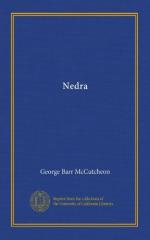Possibly it is true that she did not love her aunt. If that were the case, she kept it well to herself. She could not have been blamed, however, for disliking the dictator. Hugh Ridgeway was more or less right when he said that no one in town admired the old lady. She was hard, devoid of humor, wrapped up in her own selfishness; shrewd, capable and resourceful. Her brother, on his deathbed, signed the instrument which made this arrogant relative the arbiter of the girl’s future for many years to come. She was appointed guardian and trustee until legal age was attained, and as such she was absolute in her power. The large fortune was to be held in trust by this aunt, Mrs. Torrence, and the Hon. Stanley Goodland, until Grace was twenty-three years of age. The income from the investments in bonds, real estate and high-class securities was to be handled by Mrs. Torrence as she saw fit in the effort to better the young woman’s mental and social estate. To do her justice, she performed the duties well and honorably, even though her measure of human nature was not full to overflowing. Grace, with a mind and heart of her own, undertook to cultivate human nature from her own point of view after years of tolerance, and she succeeded so well that her aunt was none the wiser.
On one point, however, the paragon was so firm and unassailable that Grace was obliged to confess failure to her lover, after weeks and weeks of splendid argument. Her aunt forced an issue. The marriage of her niece was to be brilliant to the verge of confusion and the ante-nuptial season was to be one which the city should not forget while its promoter lived to enjoy the emoluments. She knew she was making her niece unhappy, but she argued that her niece was too deeply in love to appreciate the value of opportunity. Besides, on her wedding day, Grace Vernon would be twenty-three years of age, mistress of herself, her fortune, and her husband’s home. That day would end the reign of Elizabeth Torrence. The arbiter was determined that the reign should end in a blaze of glory.
As for Grace and Hugh, they were to be married. That had been decided upon by destiny years and years ago and ratified after Hugh had reached an age of discretion. He said that twenty-five was the year of discretion, if not of reason.
After the first transports, each began to consider the importance of the union, not only to themselves, but to the world at large. In their reflective moments they realized that the marriage would be the most wonderful event in the whole history of the homes of Vernon and Ridgeway. Never before had a Vernon married a Ridgeway, and—vice versa. Therefore, the whole world would visit upon such a union its undivided attention. That is the view all engaged people take of marriage.
Miss Vernon had employed six weeks of argument in convincing Mr. Ridgeway that a church wedding was imperative, although she admittedly preferred the simpler form, where the minister conducts the ceremony in the presence of two witnesses and a ring. Society demanded the exhibition. Mr. Ridgeway warned her that he could not survive the ordeal and would leave her a widow at the altar.




